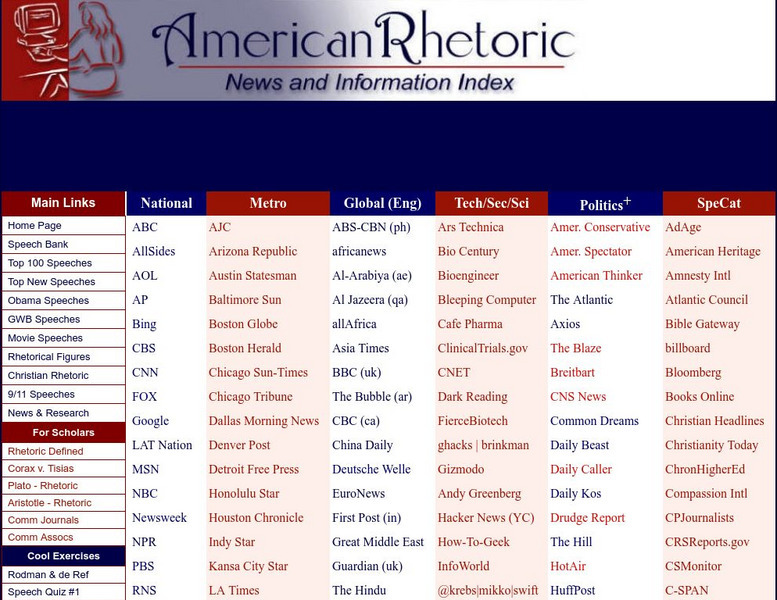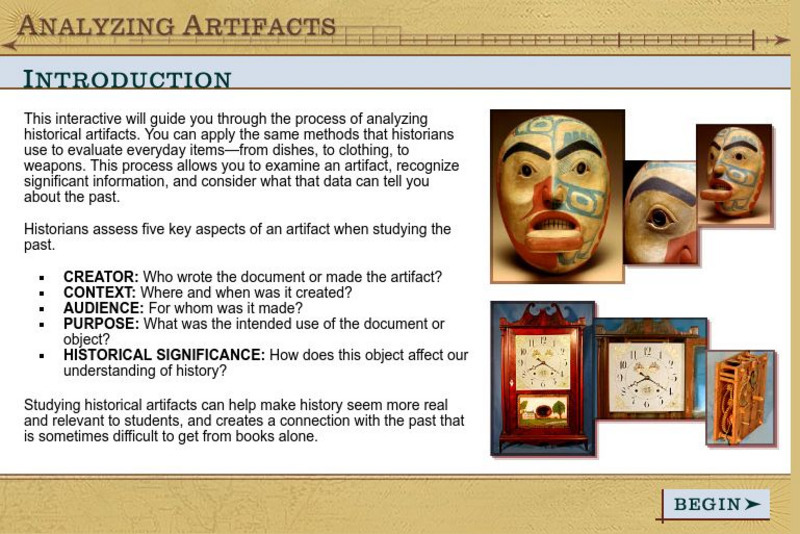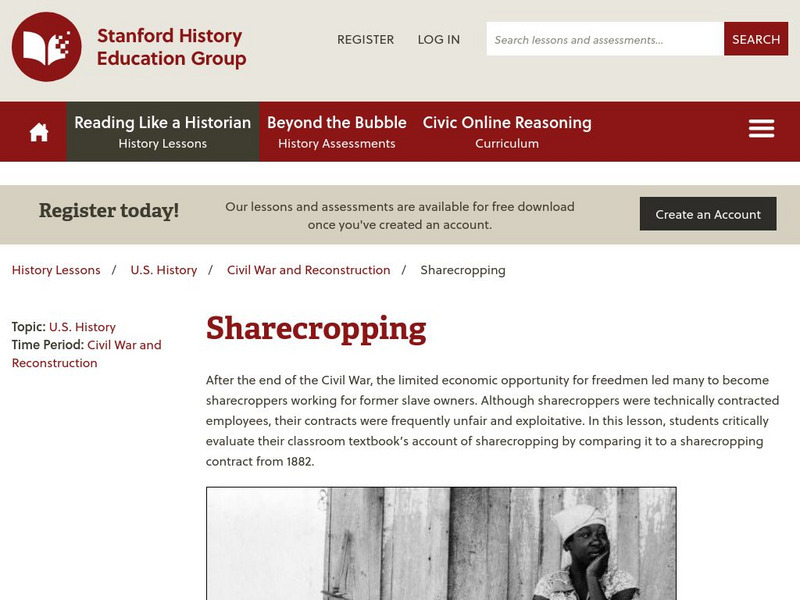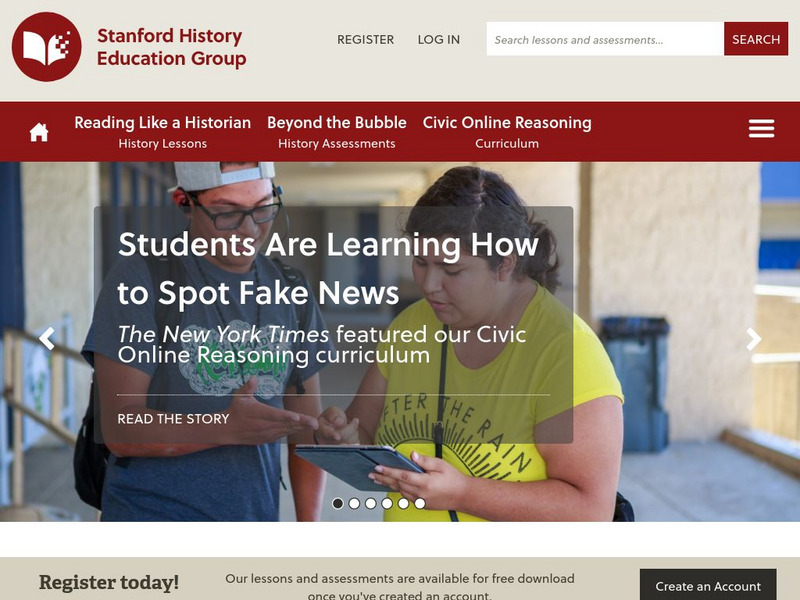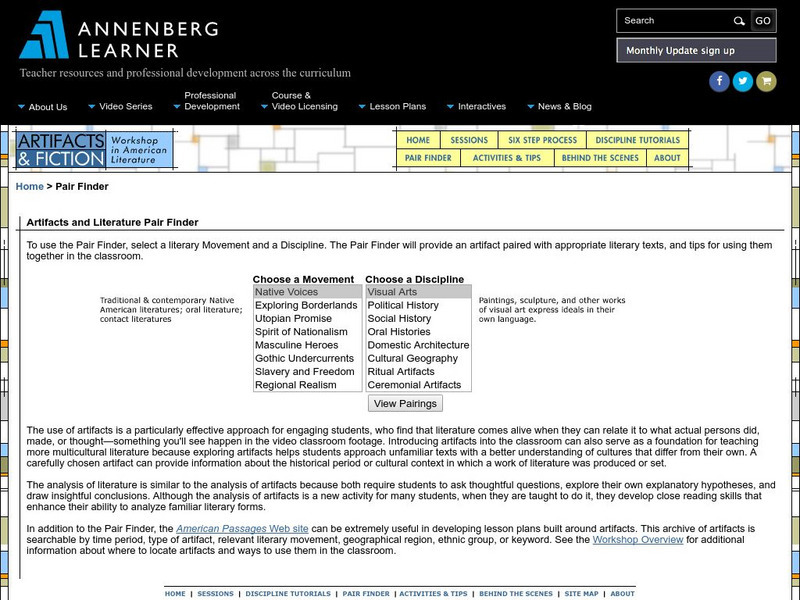Hi, what do you want to do?
Other
Georgia Tech Research Institute: Chronicling America: Us News Map
A fascinating way to look at history, this interactive map lets you search for a person, event, issue, etc. over a specified time frame and it maps newspapers containing related content onto a map of the United States. An additional...
Other
George W. Bush Library: What Do Historical Objects Tell Me? [Pdf]
A comprehensive lesson training students to analyze historical objects to determine features, reliability, authenticity, and provenance through observation skills encouraged through a variety of activities.
American Rhetoric
American Rhetoric: News and Information Index
This website is a news and information index that offers links to news sources, newspapers, magazines and journals, search engines, polling data, legal resources, and citation guides.
Other
Houston Independent School District: Social Studies Strategies [Pdf]
Hone in on methods for historical thinking and the process of historical inquiry when studying social studies.
Annenberg Foundation
Annenberg Learner: Opb American History Interactive: Evaluating Evidence
Use this interactive lesson to practice evaluating evidence from primary sources in order to draw conclusions about a historical event. In this particular case, the event is the Civil War. The challenge is to decide for yourself which of...
Annenberg Foundation
Annenberg Learner: Analyzing Artifacts
Learn the steps in the 5-step process that historians use when they analyze an artifact as you investigate what you can learn from Native American and other items.
Other
Monash University Library: Evaluating Web Pages
Use this guide to learn how to evaluate web pages. This concise guide also addresses why evaluation is important. CCSS.ELA-Literacy.CCRA.R.7
Smithsonian Institution
National Postal Museum: A Student's Guide to Historical Research
This resource focuses on teaching students how to do historical research via a series of steps. Historical photos and documents are included as examples.
Sophia Learning
Sophia: Research Sources: Websites
This slideshow lesson focuses on the use of websites for research sources. It gives the pros and cons to using websites as sources and discusses the need to evaluate websites and what to look for.
Other
Bowdoin: Reading, Writing, Researching for History: A Guide for College Students
Reference guide material discusses how to research, write and read for history.
Stanford University
Beyond the Bubble: History Assessments
[Free Registration/Login Required] A collection of innovative assessments, interactive rubrics, and annotated samples of student work with an emphasis on primary source documents for the use in a wide range of history concepts.
Stanford University
Sheg: Document Based History: Reading Like a Historian: Evaluating Sources
[Free Registration/Login Required] Are all historical sources equally trustworthy? How might the reliability of a historical document be affected by the circumstances under which it was created? In this activity, students sharpen their...
Stanford University
Sheg: Document Based History: Reading Like a Historian: Historical Thinking
[Free Registration/Login Required] This chart elaborates on the historical reading skills of sourcing, corroboration, contextualization, and close reading. In addition to questions that relate to each skill, the chart includes...
Stanford University
Sheg: Reading Like a Historian: Intro to Historical Thinking: Lunchroom Fight
[Free Registration/Login Required] A fight breaks out in the lunchroom and the principal needs to figure out who started it. But when she asks witnesses what they saw, she hears conflicting accounts. Why might these accounts differ? As...
Stanford University
Sheg: Document Based History: Reading Like a Historian: Mapping the New World
[Free Registration/Login Required] Students read primary source documents to solve a problem surrounding a historical question. This document-based inquiry lesson allows students study two 17th-century maps of Virginia and think...
Stanford University
Sheg: Document Based History: Reading Like a Historian: Sharecropping
[Free Registration/Login Required] Students solve a problem surrounding a historical question by reading primary source documents. This historical inquiry lesson plan allows students to critically evaluate their classroom textbook's...
Stanford University
Sheg: Document Based History: Reading Like a Historian: Snapshot Autobiography
[Free Registration/Login Required] What is history? And why do historical accounts differ? In this instructional activity, students create brief autobiographies and then reflect on the process to better understand how history is written....
Stanford University
Sheg: Document Based History: Reading Like a Historian: Stamp Act
[Free Registration/Login Required] Students solve a problem surrounding a historical question by reading primary source documents. This historical inquiry instructional activity allows students to engage in key aspects of historical...
Stanford University
Sheg: Document Based History: Reading Like a Historian:sourcing Classroom Poster
[Free Registration/Login Required] Sourcing asks students to consider who wrote a document as well as the circumstances of its creation. Who authored a given document? When? For what purpose? This poster reminds students before reading a...
Annenberg Foundation
Annenberg Learner: Bridging World History: History and Memory
Are history and memory different? Peruse the various resources this unit provides for the way we view, know, and relate history to our family, our friends, and the world.
Stanford University
Stanford History Education Group: Home
[Free Registration/Login Required] Working with school districts from coast to coast, and as far away as Sweden, Singapore, and Chile, the Stanford History Education Group provides teachers with high-quality resources to enrich students'...
Sophia Learning
Sophia: Research Sources
This slideshow lesson focuses on research sources by listing 10 types of sources: books, periodicals/magazines, newspaper articles, scholarly articles, databases, reviews, interviews, lectures, media (film, television), and websites. It...
Sophia Learning
Sophia: Research Sources: Periodicals
This slideshow lesson focuses on the use of periodicals as research sources; it discusses the pros of using periodicals as organizational aids and in research of current events and also the cons of periodical's lack of depth and possible...
Annenberg Foundation
Annenberg Learner: Artifacts & Fiction Pair Finder
Pair artifacts with appropriate literary texts, and find tips for using them together in the classroom by selecting a literary movement and a discipline with this handy tool.





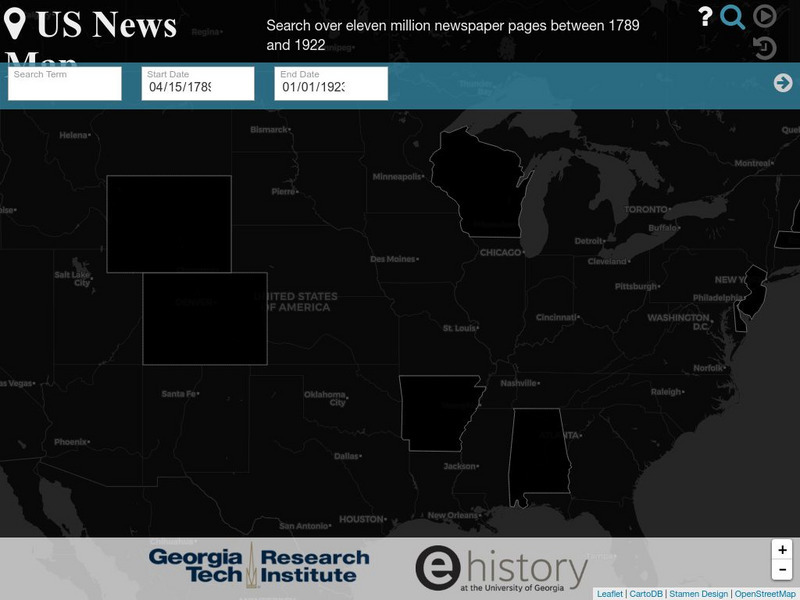
![George W. Bush Library: What Do Historical Objects Tell Me? [Pdf] Lesson Plan George W. Bush Library: What Do Historical Objects Tell Me? [Pdf] Lesson Plan](https://static.lp.lexp.cloud/images/attachment_defaults/resource/large/FPO-knovation.png)
